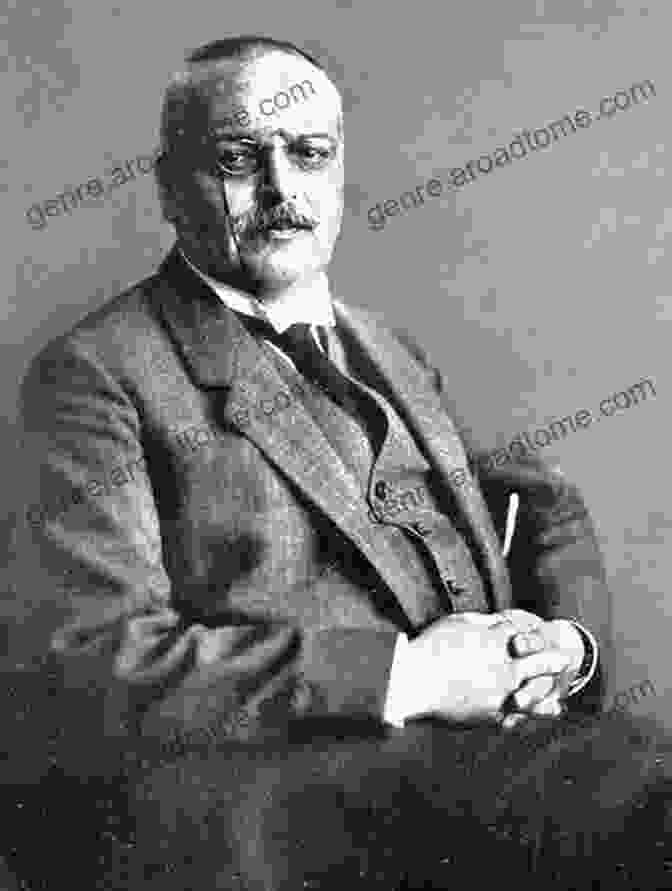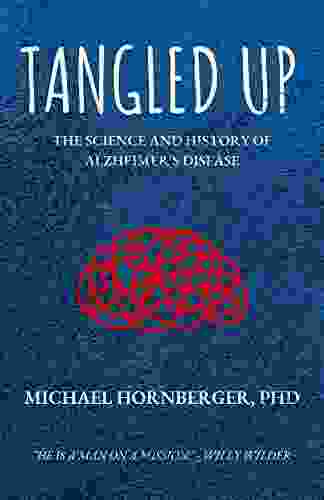The Science and History of Alzheimer's Disease: Illuminating the Enigma

Alzheimer's disease, a progressive neurodegenerative disFree Download, has emerged as a global health concern, affecting millions of individuals and their loved ones. This intricate condition, characterized by memory loss and cognitive decline, has captivated the minds of researchers, clinicians, and historians alike. In this comprehensive article, we embark on a journey through the annals of Alzheimer's disease, exploring its scientific foundations, historical origins, and the ongoing quest for understanding and treatment.
4.6 out of 5
| Language | : | English |
| File size | : | 3136 KB |
| Text-to-Speech | : | Enabled |
| Screen Reader | : | Supported |
| Enhanced typesetting | : | Enabled |
| Word Wise | : | Enabled |
| Print length | : | 308 pages |
| Lending | : | Enabled |
Alois Alzheimer: The Pioneer Who Unveiled the Disease

The discovery of Alzheimer's disease is inextricably linked to the pioneering work of German psychiatrist and neuropathologist Alois Alzheimer. In 1906, he meticulously examined the brain of a woman who had succumbed to an enigmatic condition marked by progressive memory loss, disorientation, and language difficulties. His groundbreaking research revealed the presence of abnormal protein deposits, now known as amyloid plaques, and tangled nerve fibers, later termed neurofibrillary tangles. Alzheimer's meticulous observations laid the foundation for our current understanding of the pathological hallmarks of Alzheimer's disease and earned him a place in the annals of medical history.
Scientific Insights: Unraveling the Complex Mechanisms
Over the past century, scientific advancements have significantly deepened our understanding of Alzheimer's disease. Researchers have identified genetic risk factors, explored the role of inflammation, and elucidated the molecular pathways that contribute to neuronal damage and cognitive decline. The discovery of amyloid-beta and tau proteins, the primary components of amyloid plaques and neurofibrillary tangles, has been pivotal in advancing our knowledge of the disease's pathogenesis.
The amyloid cascade hypothesis, a widely accepted theory in Alzheimer's research, suggests that the accumulation of amyloid-beta plaques triggers a series of events that lead to neuronal dysfunction and ultimately cell death. Tau pathology, characterized by the aggregation of tau protein within neurons, further disrupts neuronal communication and contributes to the progressive cognitive decline associated with the disease.
Historical Perspectives: From Ancient Observations to Modern Advancements
Although Alzheimer's disease was formally recognized in the early 20th century, its roots can be traced back to ancient times. Historical accounts from civilizations such as the Egyptians, Greeks, and Romans describe symptoms and conditions that bear striking similarities to Alzheimer's disease. Throughout history, individuals with cognitive impairments were often marginalized or institutionalized, reflecting the lack of understanding and societal stigma associated with dementia.
The 19th century witnessed the emergence of notable figures, such as Jean-Martin Charcot and Emil Kraepelin, who made significant contributions to the field of neurology and psychiatry. Their work laid the groundwork for the classification and diagnosis of mental disFree Downloads, including dementia, providing a framework for future research and clinical practice.
The Quest for Treatment: From Symptomatic Relief to Disease-Modifying Therapies
Despite the growing scientific understanding of Alzheimer's disease, effective treatments remain elusive. Current therapeutic approaches primarily focus on symptomatic management, aiming to alleviate cognitive and behavioral symptoms and improve daily functioning. Cholinesterase inhibitors and memantine, commonly prescribed medications, help to enhance neurotransmitter activity and reduce the symptoms of cognitive decline.
The development of disease-modifying therapies, which target the underlying pathological processes of Alzheimer's disease, holds immense promise. Several promising therapeutic strategies, including amyloid-beta-targeting drugs and tau-based therapies, are currently undergoing clinical trials. These treatments aim to slow or halt the progression of the disease and ultimately improve the quality of life for individuals living with Alzheimer's.
Ongoing Research and Future Directions
The quest for a cure for Alzheimer's disease continues unabated, with intensive research efforts underway around the globe. Scientists are exploring novel approaches, such as gene therapy, stem cell therapy, and immunotherapies, to tackle the multifaceted nature of the disease.
Early detection and intervention are crucial in the fight against Alzheimer's disease. The development of sensitive diagnostic tools and biomarkers that can accurately identify individuals at risk or in the early stages of the disease will enable timely interventions and improve treatment outcomes.
: Embracing Hope and Overcoming Challenges
Alzheimer's disease presents a formidable challenge to individuals, families, and societies globally. Yet, amidst the complexities and uncertainties, there is reason for optimism. Scientific advancements continue to illuminate the intricate mechanisms of the disease, while ongoing research holds the promise of novel treatments and potential cures. By embracing hope, collaborating across disciplines, and fostering a compassionate understanding of Alzheimer's disease, we can empower individuals and families affected by this enigmatic condition and work towards a future where the darkness of dementia is replaced by the light of knowledge and hope.
Join the fight against Alzheimer's disease. Support research, raise awareness, and provide compassionate care for those affected by this challenging condition.
Take Action
4.6 out of 5
| Language | : | English |
| File size | : | 3136 KB |
| Text-to-Speech | : | Enabled |
| Screen Reader | : | Supported |
| Enhanced typesetting | : | Enabled |
| Word Wise | : | Enabled |
| Print length | : | 308 pages |
| Lending | : | Enabled |
Do you want to contribute by writing guest posts on this blog?
Please contact us and send us a resume of previous articles that you have written.
 Book
Book Novel
Novel Page
Page Chapter
Chapter Text
Text Story
Story Genre
Genre Reader
Reader Library
Library Paperback
Paperback E-book
E-book Magazine
Magazine Newspaper
Newspaper Paragraph
Paragraph Sentence
Sentence Bookmark
Bookmark Shelf
Shelf Glossary
Glossary Bibliography
Bibliography Foreword
Foreword Preface
Preface Synopsis
Synopsis Annotation
Annotation Footnote
Footnote Manuscript
Manuscript Scroll
Scroll Codex
Codex Tome
Tome Bestseller
Bestseller Classics
Classics Library card
Library card Narrative
Narrative Biography
Biography Autobiography
Autobiography Memoir
Memoir Reference
Reference Encyclopedia
Encyclopedia Val Wilson
Val Wilson Victor Anselmo
Victor Anselmo Mandy Hale
Mandy Hale Kitt O Malley
Kitt O Malley Kindle Edition With Audio Video
Kindle Edition With Audio Video Kris Ferraro
Kris Ferraro Robert H Fleming
Robert H Fleming The Calculator Store
The Calculator Store Tim Hannigan
Tim Hannigan Kyle Westaway
Kyle Westaway Kristin Taylor
Kristin Taylor Laura Esquivel
Laura Esquivel Kunal Verma
Kunal Verma Kirsten Bradley
Kirsten Bradley Prince Acad
Prince Acad Kofi Awoonor
Kofi Awoonor Kunal Roy
Kunal Roy Nikki Kiyimba
Nikki Kiyimba Ray Gaiser
Ray Gaiser Lesa Snider
Lesa Snider
Light bulbAdvertise smarter! Our strategic ad space ensures maximum exposure. Reserve your spot today!

 Ashton ReedThe Back Pain Relief Plan: Discover the Proven Method to Eliminate Back Pain...
Ashton ReedThe Back Pain Relief Plan: Discover the Proven Method to Eliminate Back Pain... Nathan ReedFollow ·7.2k
Nathan ReedFollow ·7.2k Desmond FosterFollow ·16.3k
Desmond FosterFollow ·16.3k Marcel ProustFollow ·8.8k
Marcel ProustFollow ·8.8k Dustin RichardsonFollow ·15.1k
Dustin RichardsonFollow ·15.1k Chandler WardFollow ·18.1k
Chandler WardFollow ·18.1k Braeden HayesFollow ·19.3k
Braeden HayesFollow ·19.3k Corbin PowellFollow ·2.9k
Corbin PowellFollow ·2.9k Guillermo BlairFollow ·4.3k
Guillermo BlairFollow ·4.3k

 Charlie Scott
Charlie ScottQuickBooks 2024 In Depth: Your Essential Guide to...
About the Book Are you ready to elevate...

 D'Angelo Carter
D'Angelo CarterUnlocking the Mysteries of Primitive Economies: A Journey...
Prepare to embark on an...

 Milton Bell
Milton BellUnveiling the Secrets of Agile Coaching: A Comprehensive...
In the ever-evolving landscape...

 Tyler Nelson
Tyler NelsonUnveiling the Treasures of Italy: A Journey of Discovery...
Embark on an enchanting expedition into the...
4.6 out of 5
| Language | : | English |
| File size | : | 3136 KB |
| Text-to-Speech | : | Enabled |
| Screen Reader | : | Supported |
| Enhanced typesetting | : | Enabled |
| Word Wise | : | Enabled |
| Print length | : | 308 pages |
| Lending | : | Enabled |














